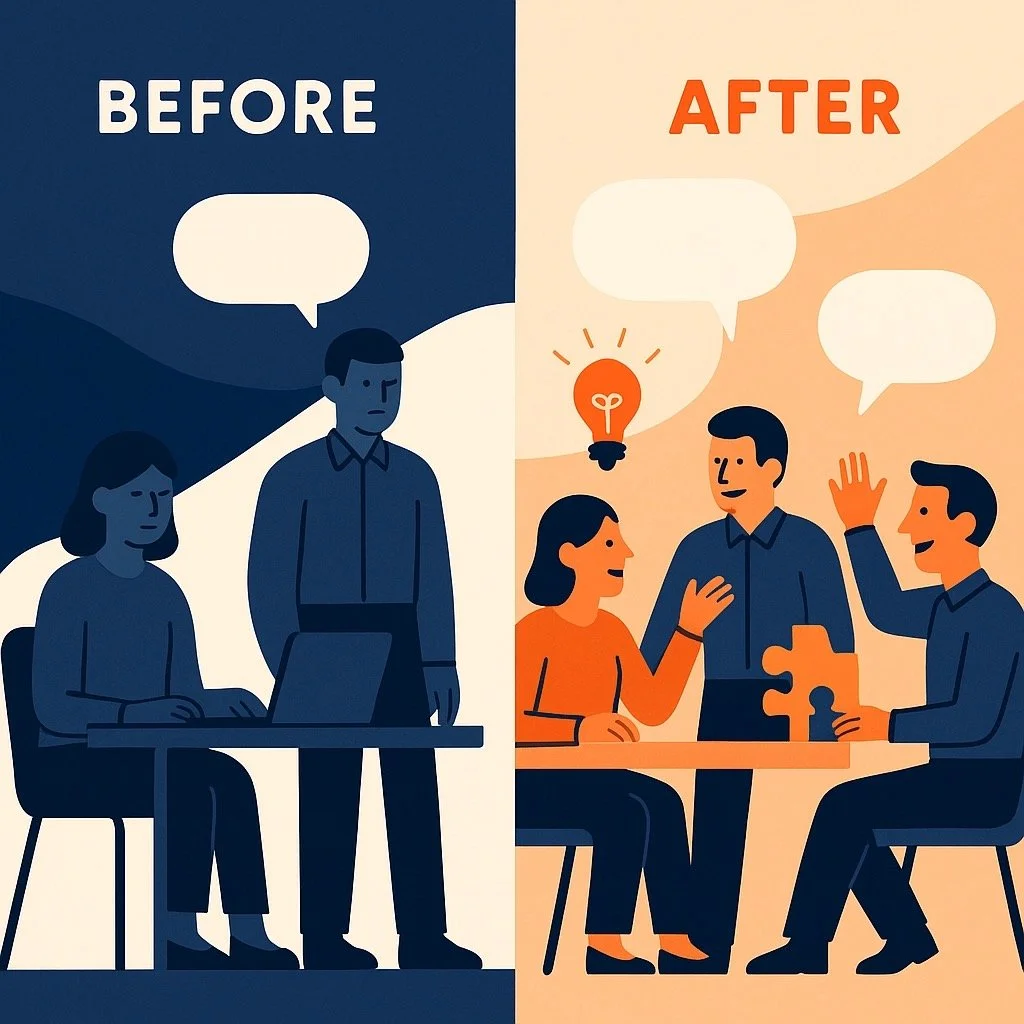Why Every Workplace Needs a Bit of Stand-Up: The Power of Comedy in Corporate Training
The Unexpected Relationship Between Punchlines and Productivity
Picture this: Your team's sitting in yet another training session. Dave from accounting is secretly playing Candy Crush. Priya from marketing is writing her shopping list. And you? You're calculating how many cups of coffee you'll need to survive until lunch.
Now imagine a different scene: Everyone's engaged, laughing, contributing ideas, and—dare I say it—actually enjoying a corporate workshop. The difference? A little bit of stand-up comedy magic.
As someone who's spent years doing stand-up before diving into corporate training, I've seen firsthand how comedy techniques transform stale workplace learning into something people genuinely look forward to. But don't just take my word for it—there's solid evidence backing up the business case for bringing comedy into your corporate training.
Why Humor Works (No, Seriously—There's Science Behind This)
Comedy isn't just about getting laughs—it's a sophisticated communication tool that triggers meaningful psychological and physiological responses. When we laugh together in a professional setting, several things happen:
Dopamine and endorphins flood our system, creating positive associations with the learning experience
Stress levels drop, opening our minds to new information and ideas
Social barriers between team members dissolve faster than free donuts in the break room
Information retention increases by up to 40% when humor is incorporated into learning
Research shows that teams with leaders who effectively use humor are 15% more engaged and significantly more likely to solve creative problems successfully. And here's the kicker—91% of executives believe a sense of humor is crucial for career advancement. Funny how that works, isn't it?
Beyond Dad Jokes: Comedy Skills That Translate to Workplace Gold
Stand-up comedy develops specific skills that directly transfer to workplace success. Let's break down the parallels:
1. Reading the Room
Great comedians instantly gauge audience energy and adjust accordingly. In the workplace, this translates to emotional intelligence—understanding when colleagues are overwhelmed, when to push forward with an idea, or when to pivot strategies.
2. Embracing Failure
Every comedian bombs occasionally. The good ones learn, adapt, and come back stronger. This resilience mirrors the innovation mindset necessary in today's rapidly changing business environment. Companies embracing "fail forward" cultures consistently outperform their risk-averse competitors.
3. Storytelling with Impact
Comedians are master storytellers who know how to structure narratives for maximum impact. In business, storytelling drives everything from sales pitches to change management initiatives. When your team can craft compelling narratives, your message sticks.
4. Authentic Presence
Stand-up forces performers to develop an authentic voice. In an era where employees and customers crave authenticity, this skill helps leaders build trust and genuine connections with their teams.
Not Just Fun and Games: Real Business Outcomes
Comedy-based training isn't just about having a good time (though that's certainly a bonus). Organizations implementing these techniques report measurable improvements:
Enhanced communication skills: Employees trained in comedy techniques show 27% higher scores in clarity and engagement during presentations
Improved creativity: Teams exposed to humor-based workshops generate 37% more viable ideas during brainstorming sessions
Better conflict resolution: Managers trained in comedic timing and tension-breaking show marked improvement in navigating difficult conversations
Increased retention: Companies incorporating humor into their culture report 18% lower turnover rates
Take Peppercomm, a PR agency that put their entire staff through stand-up comedy training. The result? Improved client relationships, enhanced presentation skills, and a more cohesive culture that helped them navigate challenging times.
How to Bring Comedy into Your Training (Without Making Everyone Cringe)
Let's be clear—we're not suggesting you hire a corporate comedian to roast your CEO or force introverted team members to perform five minutes of stand-up (though we've seen both, and only one ended well). Instead, consider these accessible approaches:
1. Start with Improv Principles
"Yes, and..." is the foundational concept of improvisation. It teaches participants to build on others' ideas rather than shutting them down. This simple principle transforms brainstorming sessions and team interactions by creating a supportive environment where ideas can flourish.
2. Incorporate Storytelling Exercises
Comedy is fundamentally about storytelling with unexpected twists. Training your team to craft compelling narratives with clear setups and satisfying payoffs improves everything from customer presentations to internal communications.
3. Practice Status Play
Comedians master the art of playing with status—intentionally raising or lowering their perceived position relative to others for effect. This awareness helps teams navigate hierarchies more effectively and creates more authentic connections across organizational levels.
4. Use Humor for Perspective Shifting
Comedy often comes from looking at familiar situations from unusual angles. This skill directly translates to problem-solving and innovation by training your team to view challenges through multiple lenses.
The Chatterbox Approach: Serious Results Through Not-So-Serious Methods
At Chatterbox Workshops, we've developed programs that seamlessly blend comedy techniques with practical business applications. We don't just make training more fun—we make it more effective by incorporating elements that professional comedians use every day.
Our workshops incorporate principles from stand-up, improv, and storytelling to create experiences that participants remember long after the training ends. The result? Teams that communicate more effectively, collaborate more naturally, and approach challenges with confidence and creativity.
Real Talk: When Comedy Training Makes Sense (And When It Doesn't)
Comedy-based training shows particular impact when your organization is facing:
Communication silos between departments
Low engagement during presentations or meetings
Innovation plateaus where the same ideas keep circulating
Team integration challenges following restructuring or new hires
Leadership development needs, especially around authentic communication
However, comedy techniques aren't a magic bullet. They work best as part of a comprehensive training approach that includes structured learning, practical application, and ongoing reinforcement. And timing matters—introducing humor-based training during periods of severe organizational stress might not land well (comedians understand timing is everything).
Taking the First Step: How to Start Incorporating Comedy into Your Workplace
Ready to bring some stand-up spirit into your corporate training? Start small:
Begin meetings with a quick improv warm-up – Simple exercises like word association games get creative energy flowing and break down inhibitions.
Create "yes, and" zones for specific brainstorming sessions – Designate times when all ideas are welcomed and built upon rather than immediately critiqued.
Incorporate storytelling into your presentation training – Challenge team members to present information as compelling narratives rather than bullet-point lists.
Consider bringing in professionals – Specialized workshops designed around comedy principles can fast-track your team's development in these areas.
The workplace doesn't need to be a comedy club, but incorporating elements of stand-up into your training creates more engaging, effective, and memorable learning experiences. Plus, you'll never have to watch Dave from accounting play Candy Crush during a workshop again—and that's no joke.
Ready to bring some comedy magic to your corporate training? Check out our gamified workshop approach or learn more about how comedy improves workplace performance.




